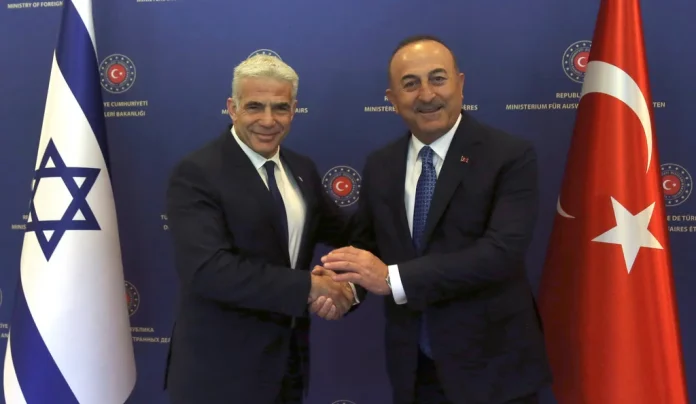Reconciled, but for how long? Here is some relationship advice for Israel and Turkey – on how to avoid being swept back again into a familiar pattern of crisis, rancor and recriminations.
Almost six months since Israeli president Isaac Herzog visited his counterpart Turkish President Recep Tayyip Erdogan in Ankara, the two countries have reached an agreement renewing full diplomatic ties, which includes the reinstatement of their respective ambassadors.

And just as important, Israel took note that despite the appearance of bad relations, Turkey continued to maintain an open channel with it on domestic security issues. This was thrown into sharp relief this summer when cooperation between each country’s security officials foiled an Iranian terrorist attack targeting Israeli citizens on Turkish soil.
The swift action taken by the Turkish authorities against those terror cells provided a unique window into the close collaboration between the internal security apparatus of both countries. While Turkey is a consistently popular tourist destination for Palestinian citizens of Israel, it seems like the return of mass tourism by Israeli Jewish tourists (a much larger market) will happen soon.
With Israel ranking as one of the most expensive countries in the world, even for someone from the average Turkish middle class, a single day hanging out in Tel Aviv would amount to taking a large chunk of their monthly salary. The value of those salaries has plummeted as the country battles a staggering 80 percent inflation rate, with some unofficial estimates calculating its true rate as double that figure.
But while Turkey remained steadfast in its support for Islamists throughout the Arab world during the last decade, Israel made its ties with the United Arab Emirates public; and while Turkey remained at loggerheads with Egyptian president Abdel-Fattah al-Sissi, Israel reached out to Cairo to establish regional deals on natural gas, extending the hand of cooperation to Greece and Cyprus as well.
For Palestinians, especially in Gaza, Turkey is an important outlet for university studies and a place to visit, study and reside (even if getting there, via Egypt, is by no means an easy route). Turkey’s investment in Palestinian infrastructure also provides crucial services, such as Gaza’s Turkish-Palestinian Friendship hospital. In the West Bank, Turkey has invested a great deal in cultural and heritage sectors, and its continued expansion of influence there is greatly contingent on sustainable ties with Israel.

While all the details of the agreement to reinstate full relations are unknown, it is safe to say that Israel’s demands to end Hamas’ free movement in Turkey, especially those recruitment and planning operations for its military actions against Israel, have been met.
While it is too early to tell if Hamas is also embarking on a new strategy vis-à-vis Israel, its silence during the last round of fighting between Israel and the Palestinian Islamic Jihad is notable. Perhaps there is now an opportunity for Turkey to rebuild its credit with Israel to influence it to embark on a new Palestinian policy (even if this now seems a distant prospect) since clearly the decade-plus of strained relations between the two countries has hurt Palestinians more than it has helped them.It would be a wise insurance policy for both Turkey and Israel to establish a new bilateral dynamic based on mutual trust aimed at benefitting both populations. Two obvious targets for this grassroots consolidation are culture and education, building on the mutual appreciation of Turkish artists in Israel and vice versa, and on years of interaction in academia.
Both countries find themselves at a fateful political crossroads. Israel is now set for November elections, its fifth in just over three years. It’s fortunate that the normalization of relations happened now before Benjamin Netanyahu’s possible return to power. Turkey, too, is on the threshold of possible political change with its opposition parties now carving out a unified strategy to push Erdogan out of office in the 2023 elections, no matter how tough a challenge this appears to be.

It would certainly serve the cause of stability and consistency in Turkey-Israel relations if the ambassadors that will return to Tel Aviv and Ankara not be political appointees (an option offered by Turkey a few years back) but career diplomats who can maneuver rough waters when they occur.
For now, as someone who has watched (and lived through, in person) the ups and downs of Turkish-Israeli relations for two decades, I will wish them both hayirli olsun – best wishes on the new relationship. It will now be up to both Turkey and Israel’s leaders, but also to their peoples, to maintain this momentum – or be swept back into the more familiar pattern of perennial crises, rancor and recriminations. My humble suggestion: This time, do it right.




